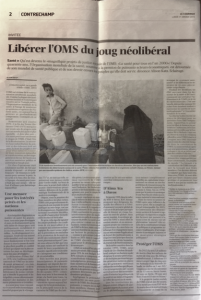Priti Patnaik. Weekly IHP news: http://www.internationalhealthpolicies.org/
___________________________________________________________
Article on WHO by Alison Katz. Le Courrier 20.1.2019
 https://lecourrier.ch/2019/01/20/liberer-loms-du-joug-neoliberal/
https://lecourrier.ch/2019/01/20/liberer-loms-du-joug-neoliberal/
______________________________-
Sponsorship of paediatric associations by manufacturers of breastmilk substitutesTony Waterston and Charlotte Wright https://www.thelancet.com/journals/lancet/article/PIIS0140-6736(18)32845-9/fulltext Is it right that paediatric meetings should be sponsored by manufacturers of formula milk? There has recently been criticism of an international conference run by the UK Royal College of Paediatrics and Child Health (RCPCH) in Cairo, Egypt, in January, 2019, that received sponsorship by manufacturers of breastmilk substitutes (BMS).1 On Jan 31, 2019, “in light of recent concerns raised by members”, the RCPCH stated “we have made the decision to suspend future funding agreements with formula milk companies pending a College review of our relationships with them”.
|
BMJ News:
Formula milk: RCPCH promises to review funding arrangements with industry
The Royal College of Paediatrics and Child Health has said that it has suspended “future funding agreements” with the infant formula milk industry while it conducts a review.
The decision came after growing pressure from doctors and campaigners who have been calling for the college to sever its ties with the industry, saying that such relations are incompatible with the healthy promotion of breastfeeding, especially in low and middle income countries, which are vulnerable to predatory advertising.
The BMJ recently reported that 12 organisations and 84 individuals, mostly clinicians, had accused the college of acting against WHO’s code on marketing breastmilk substitutes and associated World Health Assembly resolutions, at a conference the college held in Cairo on 29 January.1 Conference sponsors included Nutricia, Danone, and Nestlé, all of which make formula milk products.
The WHO rules state that breastmilk substitutes and infant formula manufacturers “should not . . . …
